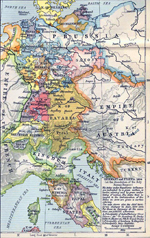|

Pillnitz
Castle
Declaration of Pillnitz — August 27,
1791
Prodded by the outbreak of the
 French Revolution
on July 14, 1789, monarchists in Europe felt considerably
crept out. And rightly so.
French Revolution
on July 14, 1789, monarchists in Europe felt considerably
crept out. And rightly so.
|
|
Image Above
Pillnitz Castle,
near Dresden, Germany — A gift from
 Augustus II
the Strong to his mistress, the Countess
Constantia von Cosel, back in the days when men
knew how to reward a decent relationship. Augustus II
the Strong to his mistress, the Countess
Constantia von Cosel, back in the days when men
knew how to reward a decent relationship.
© Schlösserland Sachsen |
The aristocracy of France
emigrated, at least the ones who could pack their bags
swiftly enough, and tried to re-establish their power from
abroad. One of these émigrés was the
Comte of Artois, brother
of the French
 King Louis XVI.
The latter would end up on the
King Louis XVI.
The latter would end up on the
 guillotine in 1793.
guillotine in 1793.
The Comte of Artois himself
would become French
 King Charles X in 1824.
But back to the Declaration of Pillnitz.
King Charles X in 1824.
But back to the Declaration of Pillnitz.
The Comte of Artois called for a
meeting at Pillnitz Palace, and from August 25 to 27, 1791,
he discussed with
 Frederick William II,
king of Prussia, and
Frederick William II,
king of Prussia, and
 Leopold II,
Holy Roman emperor, the recent political developments in European history. Leopold II,
Holy Roman emperor, the recent political developments in European history.
The result was the Declaration
of Pillnitz.
Significance of
the Declaration of Pillnitz
By appealing to all European
monarchs to help re-establishing the French monarchy, this
declaration made the French Revolution a European question.
In France, this declaration was
regarded as an avowal to undo the Revolution.
France declared war on Austria
on April 20, 1792, thus commencing the
 French Revolutionary Wars
with the
French Revolutionary Wars
with the
 War of the First Coalition.
War of the First Coalition.
Host of this conference, by the way, was
 Frederick Augustus I.
Pillnitz castle was his summer residence. And it made sense
being friendly to the leaders of Prussia and Austria,
because his Saxony was sandwiched by the two.
Frederick Augustus I.
Pillnitz castle was his summer residence. And it made sense
being friendly to the leaders of Prussia and Austria,
because his Saxony was sandwiched by the two.
See map:

1806 Germany
and Italy
However, Frederick Augustus I
would later become one of
 Napoleon's most
loyal allies.
Napoleon's most
loyal allies.
The Declaration
of Pillnitz - Text
Here is the German transcript of the Declaration of Pillnitz (Deklaration
von Pillnitz or also called Pillnitzer Punktuation)
Nachdem Seine Majestät, der Kaiser, und Seine Majestät, der König
von
Preußen, die Wünsche und Vorstellungen von Monsieur und dem Herrn
Grafen
von Artois vernommen: so erklären sie vereint, daß sie die Lage, in
welcher der
König von Frankreich sich jetzt befindet, als einen Gegenstand eines
gemeinschaftlichen Interesse für alle europäische Souverains
betrachten.
Sie
hoffen, daß sie sich folglich nicht weigern werden, in Verbindung
mit Ihren
Majestäten die kräftigsten Mittel, nach dem Verhältnisse ihrer Macht,
anzuwenden, um den König von Frankreich in den Stand zu setzen, in
volkommener Freiheit die Grundlagen einer monarchischen Regierung zu
befestigen, die den Rechten der Souverains ebenso zuträglich sei,
als dem Wohl der französischen Nation.
Alsdann und in diesem Falle sind besagte Ihre Majestäten, der Kaiser
und der
König von Preußen entschlossen, in wechselseitiger Uebereinstimmung,
mit der
nötigen Macht schnell zu agiren, um den vorgesetzen und
gemeinschaftlichen
Endzweck zu erreichen.
Mittlerweile werden sie ihren Truppen die
dienlichen
Befehle erteilen, damit sie im Stande sein mögen, sich in Aktivität
zu setzen.
Pillnitz, den 27 August 1791
Unterzeichnet:
Leopold und Friedrich Wilhelm
And here is the English translation:
Their
Majesties, the Emperor and the King of
Prussia, having heard the wishes and
proposals of Monsieur and the Count of
Artois, jointly declare that they view the
situation in which the King of France
currently finds himself as a subject of
common interest for all of Europe's
sovereigns.
They hope that this interest can
not fail to be recognized by the powers from
whom assistance is being requested.
Consequently, jointly with their respective
Majesties, they will use the most efficient
means in relation to their strengths to
place the King of France in a position to be
totally free to consolidate the bases of a
monarchical government that shall be as
amenable to the rights of sovereigns as it
is to the well-being of the French nation.
In this case
then, their said Majesties, the Emperor and
the King of Prussia are resolved to act
quickly, in mutual agreement, and with the
forces necessary to achieve the proposed and
common goal.
Meanwhile, they shall issue
their troops the necessary orders to prepare
them for action.
Pillnitz,
August 27, 1791
Signed:
Leopold and
Frederick William
More History
|